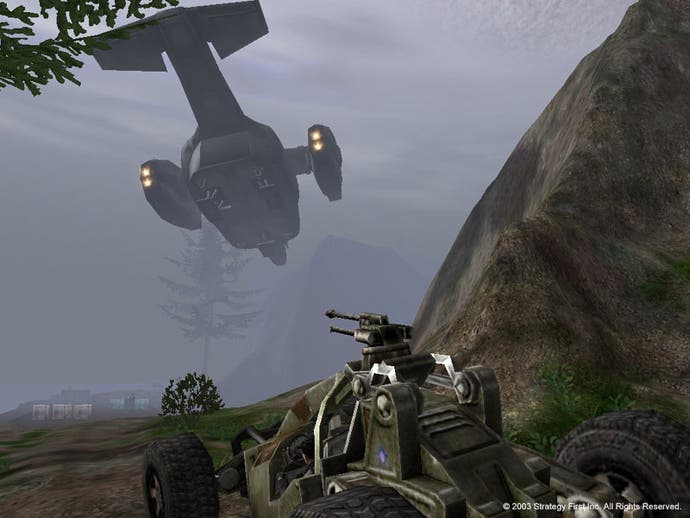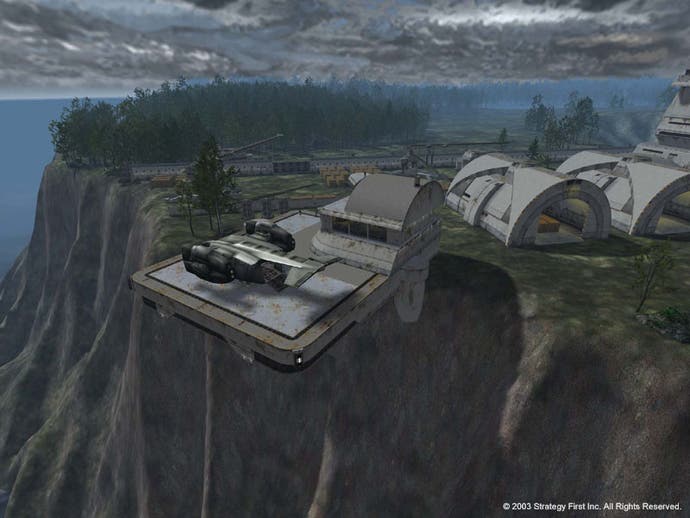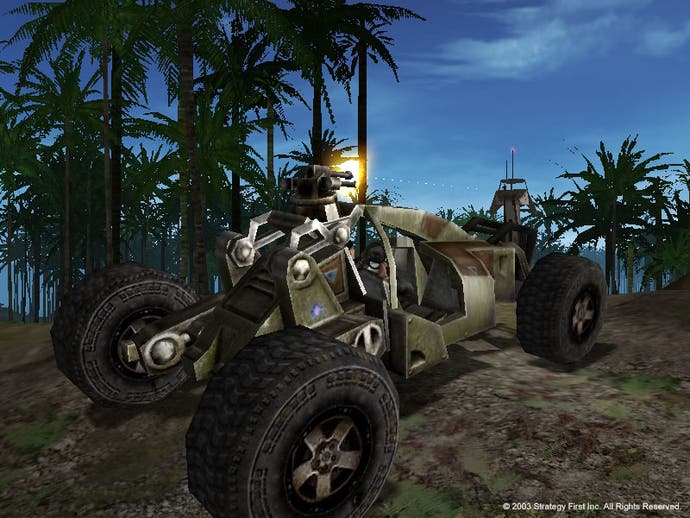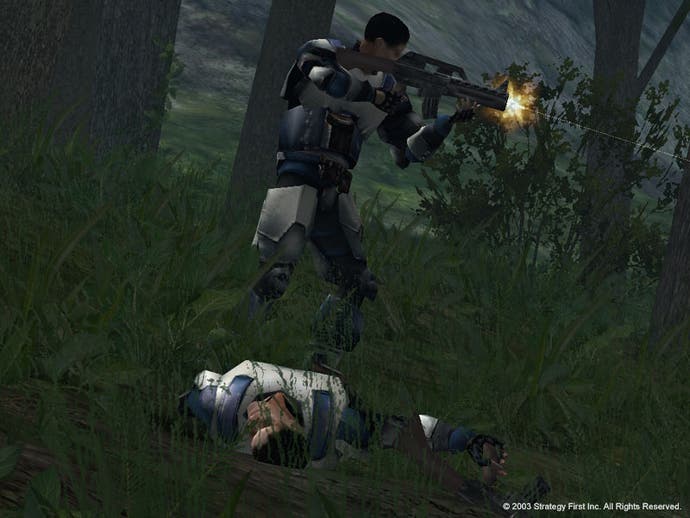Chrome
Martin gets to grips with Techland's shiny new FPS.
This introduction was to play host to the requisite Polish/polish/Chrome jokes, but something happened after we played Techland's first ever action title. Something bad. Our sense of humour simply drained away, along with our will to live, sense of direction and the ability to clean ourselves. It's another random, practically unknown first-person shooter trying to be King of the Underdogs, which ends up wearing our sanity as a crown.
Logan's run

You assume the role of Logan, a mercenary who served in the "elite Spec Force", now involved in a plot that is well over his head. Naturally, in the future all galaxy-wide conflicts have something to do with huge corporations. Shady ones. And in Chrome, their success is dependent on a plentiful supply of a rare resource called - that's right - Chrome.
The game starts with Logan and his pal making their way to the surface of a planet for a spot of daylight robbery. Planet Zorg, it's called. Aha. With a smirk, we started. The first thing that strikes you is that Chrome's environments look stunning, and there's no denying the amount of effort Techland has put into designing landscapes that would put Alan Titchmarsh to shame. However, once we got stuck into the combat, the lack of sophistication became glaringly obvious.
Chrome isn't a dreadful game, really. It's just so deeply, incredibly average in every aspect of its gameplay that our enthusiasm for it went limp the very moment we bumped off our first enemy grunt. It does however make a valiant attempts to be the best of a bad bunch by borrowing elements here and there from some of the best examples in the FPS genre.
Loading...

First of all, the sprawling landscapes of Battlefield 1942 are taken up a notch and sprinkled with masses of lush vegetation that sways to and fro rather dramatically. The sun-kissed rolling vistas of the opening levels really are a sight to behold, and we could quite easily picture ourselves sprinting through the virtual meadows in the sun, arms aloft, probably naked. The huge levels come at a price, however, with enormous load times allowing us time to craft a fine cup of charlie before any black-clad idiots arrived for a lead sandwich.
The inventory management and augmentations of Deus Ex also join the fun, albeit in stripped and dumbed down forms. Logan is able to carry a finite amount of equipment and weaponry with him, and you are able to fiddle with his loadout on the fly in order to best suit the challenges he faces, as well as pinch medical packs, weapons and ammo from the corpses of enemies. The inventory interface actually works very well, with a single interface presenting you with each item neatly placed within a grid, letting you click and drag to reorganise, and drop items altogether by throwing them outside of the window.
The augmentations aren't collected as in Deus Ex, they merely appear as you progress through the game, and their functions are what you might expect - speed boost, ballistic armour and better sight and accuracy all make an appearance. However the use of these implants is limited because they can quickly overload Logan's nervous system, and as such you can only really make use of them in short bursts. This does at least prevent players from becoming walking tanks, firing up all their implants to obliterate everything in their path, but...
Seen it. Seen it. Seen it...

None of this helps Chrome stand out as anything remarkable. The vaguely interesting story is played out via game engine cut-scenes and radio chatter with your partner, and the gameplay isn't particularly varied or dynamic, merely shuffling you from one level to the next until you get bored or die. Once you get past the initial visual thrill, the glaring flaws shine through and the game begins to underachieve in so many areas that the fun simply drains away, leaving a thoroughly hollow experience behind.
For example, while the variety of landscapes you'll shoot your way across are beautifully created, the lack of any real interaction with the world makes the levels themselves feel rather static and set-like. Barrels don't tumble when struck, boxes and crates disappear in puffs of smoke, each pane of glass shatters in the exact same way... What's missing is the fine detail that makes you feel like you're actually there.
Even your enemies serve as little more than target practice. Admittedly, we were caught out a few times by flanking manoeuvres and some nifty dashes for cover, but generally speaking they didn't have the brains to put up much of a fight - save wildly slinging bullets at the mock-scenery around us. Which is odd, because whether you're carefully picking your way through heaped vegetation or standing out in the open with a target strapped to your face, they'll still spot you from halfway across the gargantuan map and start firing. Any notion of tactical play is neutered pretty fast. You can't even fire while peeking around corners.
When in Chrome...

The pre-fabricated interiors only hastened the rot, with dull building sections contrasting sharply and unpleasantly against the gorgeous landscapes, and you get the impression the whole game was built around big, pretty jungles and expansive landscapes. And built poorly.
The ragdoll physics that developers seem so keen to inject into their cannon fodder these days are poorly implemented, too. A double-tap shot to the head with an automatic rifle will sometimes send an enemy soldier dramatically somersaulting six feet into the air for no apparent reason. At other times, men will wobble on their feet as if they're being electrocuted before tumbling into a mangled, twitching heap. This isn't the kind of twitching you'd expect from somebody who's just been shot dead though; it's the kind of twitching you get when a game engine can't figure out where to place the corpse's limbs on the terrain. Or when we've overindulged at the office Christmas party.
Techland has tried to bring some variety to the running and gunning with the introduction of vehicles, but these are rarely much use beyond getting out of a tight spot at the end of a level. They were probably tacked on after the dev team played Halo. They're not even much fun to play with, handling like they're on a pivot and feeling as if they haven't got much to do with the landscape beneath them.
A feeling of freedom would have drawn us in, but you're held back here too - you can't even get into shallow pools of water. There wasn't any specific reason why we wanted to get in the water, but then we couldn't see anything to stop us either. After that, our eagerness to explore was left for dead when we took some time to clamber along an outdoor gantry to rain lead on some guards from above. When we finished picking off our unwary adversaries, we attempted to climb down onto a nearby rock a mere three feet below the gantry. Doing so killed us instantly because the game didn't know what to do about us climbing around on top of a rock.
Rustic
If you're honestly desperate for a shallow FPS with nice vegetation, go and play Quake 2 in the garden. If you're still desperate, download the demo and try it for yourselves. But if you ask us (and you kind of did), there is nothing remarkable, interesting or surprising about Chrome. It retreads the path of a hundred games before it, fails to beat its own track in any way, and still gets caught in the prickly bushes. We've certainly played worse first-person shooters, but that's hardly a recommendation.

